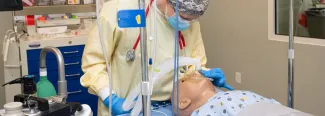Earn Your Doctor of Nursing Practice in Nurse Anesthesia at Maine’s Leading Health University
UNE’s Doctor of Nursing Practice in Nurse Anesthesia program, located in Portland, Maine, produces highly-skilled, well-rounded D.N.P.s with extensive experience in every category of medical procedure in which anesthesia is called for. You will have access to hands-on training, first in our high-tech simulation center and then through extensive clinical training in rural settings, at CRNA-only sites, and in all of the surgical specialties, including neurosurgery, open-heart surgery, and obstetrics. In addition to mastering medical procedures related to anesthesia, you will graduate with research experience as well as vast knowledge of health care systems, special patient populations, and health care policy — all of which equip you to pursue a range of professional avenues, including clinical practitioner, business owner, independent contractor, chief nurse anesthetist, researcher, educator, or an executive-level administrator.
Why UNE for your Nurse Anesthesia Degree
- Where you get your training matters. At 100% in 2024 our M.S.N.A. degree program graduates’ first-time NCE pass rate was nearly 10 percentage points above the national average. Learn more about the exam and UNE pass rates.
- You benefit by attending a comprehensive health sciences university that is nationally recognized for excellence in preparing students for collaborative, interprofessional, team-based care. Reap the rewards of training alongside future physicians, nurses, physician assistants, pharmacists, dentists, and other health professionals.
- Our interactive, state-of-the-art classrooms offer the latest media and medical instruction technology to our D.N.P program candidates, while our Interprofessional Simulation and Innovation Center is equipped with several high fidelity patient simulators with which you will practice your skills and build confidence in the work that you will perform in your profession.
- From our caring and communicative faculty members who are willing to go the extra mile for you to our skilled tutors in the Student Academic Success Center and our mentoring program that pairs incoming D.N.P. degree candidates with advanced nurse anesthesia students, you can be assured that you will be in a supportive environment with people who value you as a person as well as your professional success. With our low attrition rate and our high first-time NCE pass rate, the proof that we care about our students is in the numbers.
of our students pass the NCE on the first try
Percentage POINTS OUR GRADUATES EXCEEDED THE NATIONAL AVERAGE NCE first-time pass rates by
EMPLOYMENT RATE within 6 months of graduation
Approximate number of hospitals and facilities in New England with CLINICAL TRAINING SITES
The final UNE M.S.N.A. class graduated in 2023 and 2024. The first D.N.P. class will graduate in August 2025.
What Will you Study? Nurse Anesthesia Curriculum Overview
UNE’s Portland, Maine-based D.N.P. in Nurse Anesthesia degree program operates on a 36-month, full-time calendar, beginning each September with a new entering class. For the first two semesters, you may continue your employment, as you will take online classes, coming to campus for long weekends just once or twice per semester. You will then transition to being on campus full-time beginning with the first summer session after you matriculate. After two semesters of on-campus didactic courses, you will, in the fifth semester, proceed to the clinically-based portion of the program, comprising five semesters that emphasize advanced coursework, simulation lab experiences, clinical training within our 38 partner hospitals throughout Northern New England, and completion of a scholarly research project. Through a breadth of clinical experiences and participation in more than 600 anesthesia cases, you will achieve clinical competency and will be eligible to take the National Certification Exam.
Curriculum
- The first two (2) semesters are conducted in a hybrid format with coursework online. Students will come to campus one (1) to two (2) weekends per semester for in-person classes.
- During the second two (2) semesters, students will attend classes full-time on the Portland campus. The majority of the basic science and anesthesia didactic courses are offered during this period. Cadaver lab experience is provided during the on-campus semesters. The remaining nineteen (19) months of the program are clinically based, with an emphasis on advanced coursework, clinical training, simulation lab experiences, and completion of a senior research project. All students are required to complete the entire curriculum with a minimum cumulative GPA of 3.0 and semester GPA of 3.0. The minimum acceptable grade in any course is a B-.
- The purpose of the catalog is to provide a comprehensive list of required courses. The School of Nurse Anesthesia can provide a degree map listing which courses are taken in each stage of this timeline.
| Program Required Courses | Credits |
|---|---|
| ANE 701 – Fundamentals of Anesthesia | 3 |
| ANE 702 – Basic Principles of Anesthesia I | 3 |
| ANE 703 – Basic Principles of Anesthesia II | 3 |
| ANE 704 – Advanced Pharmacology I | 3 |
| ANE 705 – Advanced Pharmacology II | 3 |
| ANE 706 – Advanced Anatomy and Physiology I | 3 |
| ANE 707 – Advanced Anatomy and Physiology II | 3 |
| ANE 708 – Advanced Pathophysiology I | 3 |
| ANE 709 – Advanced Pathophysiology II | 3 |
| ANE 710 – Airway Management | 2 |
| ANE 712 – Professional and Role Development of the CRNA | 3 |
| ANE 714 – Advanced Physical Assessment Across the Lifespan | 3 |
| ANE 715 – Advanced Principles of Anesthesia I | 3 |
| ANE 716 – Advanced Principles of Anesthesia II | 3 |
| ANE 717 – Pain Theory and Management in Clinical Practice | 4 |
| ANE 718 – Pathophysiology and Management of the Patient with Chronic Pain | 2 |
| ANE 719 – Economics, Ethics, and Healthcare Policy | 3 |
| ANE 720 – Leadership in Advanced Practice Nursing and the Evolving Healthcare System | 3 |
| ANE 722 – Epidemiology, Population Health, and Prevention | 3 |
| ANE 723 – Using Informatics to Improve Healthcare Quality and Safety | 3 |
| ANE 724 – Senior Symposium I | 1 |
| ANE 725 – Senior Symposium II | 1 |
| ANE 726 – Translational Research and Evidence Based Practice | 3 |
| ANE 727 – Introduction to Scholarly Project | 2 |
| ANE 729 – DNP Scholarly Project II | 2 |
| ANE 730 – DNP Scholarly Project III | 1 |
| ANE 732 – Clinical Practicum I | 2 |
| ANE 734 – Clinical Practicum II | 2 |
| ANE 736 – Clinical Practicum III | 2 |
| ANE 738 – Clinical Practicum IV | 2 |
| ANE 740 – Clinical Practicum V | 2 |
| ANE 742 – Anesthesia Disaster and Crisis Resource Management | 1 |
| Minimum Total Required Credits | 80 |
|---|
Clinical training
Upon completion of the on-campus didactic semesters of the program, the students move on to the nineteen (19)-month clinical portion of the curriculum. The primary focus is clinical experiential anesthesia education. The clinical experience obtained encompasses all areas for the student to achieve clinical competency and required skills in anesthesia. This is accomplished through affiliations at various clinical sites. The Council on Accreditation of Nurse Anesthesia Educational Programs (COA) has set minimum standards for clinical experiences that each student must achieve prior to graduation from the program to qualify for the National Certifying Examination. Each student is required to administer a specific number of anesthetics including all techniques, agents, and patients across the lifespan.
All types of anesthesia techniques and the latest agents are available for student learning. Students are able to obtain experience in general anesthetics, intravenous agents, invasive line placement, and regional anesthesia including spinal, epidural, and peripheral nerve blocks including the use of ultrasound. During the clinical phase, more than the required minimum case numbers and clinical hours are obtained. All of the surgical specialties are included, and specialty experiences such as neurosurgery, open-heart surgery, and obstetrics are obtained through clinical rotations. Each student spends two (2) months in a CRNA-only clinical site.
Clinical Affiliates
Please refer to the clinical education website for a list of clinical sites currently utilized by the School of Nurse Anesthesia.
Academic and Technical Standards
WCHP Academic Policy
The Department of Nurse Anesthesia, the Westbrook College of Health Professions and the University of New England are committed to offering a quality Nurse Anesthesia Education program that complies with the evaluative criteria of the Council on Accreditation of Nurse Anesthesia Educational Programs (COA). The program provides learning experiences and didactic knowledge to enable graduates to take the National Certifying Exam and become providers of high-quality anesthesia. Please refer to the WCHP Graduate Program Progression Policies and Procedures (PDF) for a detailed description of academic standards.
Clinical Experience for the Nurse Anesthesia Degree
Upon completion of the campus-based portion of the program in April, you begin the 19-month hospital-based phase. Your clinical anesthesia training provides a breadth of experiences necessary to achieve clinical competency in anesthesia.
You participate in more than 600 anesthesia cases through our affiliations with sites throughout New England, satisfying the standards set by The Council on Accreditation of Nurse Anesthesia Educational Programs in order to qualify for the National Certifying Examination.
You obtain experience in general anesthetics, intravenous agents, and regional anesthetics—including spinal, epidural, Axillary blocks, and Bier blocks. All of the surgical specialties are available to you, including hands-on training in neurosurgery, open-heart surgery, high-risk obstetrics, and so on.
as of December 17, 2025
- Berkshire Medical Center, Pittsfield, MA
- Beth Israel Deaconess, Plymouth, MA
- Boston Children’s Hospital, Boston, MA
- Cary Medical Center, Caribou, ME
- Central Maine Medical Center, Lewiston, ME
- Concord Hospital, Concord, NH
- Cottage Hospital, Woodsville, NH
- Crane Center for Day Surgery, Pittsfield, MA
- Dartmouth-Hitchcock Medical Center, Hanover, NH
- Elliot Hospital, Manchester, NH
- Emerson Hospital, Concord, MA
- Exeter Hospital, Exeter, NH
- Good Samaritan Hospital, Brockton, MA
- Houlton Hospital, Houlton, ME
- Kent County Memorial Hospital, Warwick, RI
- Littleton Hospital, Littleton, NH
- Maine General Medical Center – Augusta/Waterville, ME
- Maine Health Memorial Hospital, North Conway, NH
- Maine Medical Center, Portland, ME
- Mayo Regional Hospital, Dover Foxcroft, ME
- Memorial Hospital, North Conway, NH
- Mercy Hospital, Springfield, MA
- MidCoast Hospital, Brunswick, ME
- Millinocket Regional Hospital, Millinocket, ME
- Northeastern Vermont Regional Hospital, St. Johnsbury, VT
- Northern Light AR Gould Aroostook Medical Center, Presque Isle, ME
- Northern Light Eastern Maine Medical Center, Bangor, ME
- Northern Light Maine Coast Memorial Hospital, Ellsworth, ME
- Northern Light Mercy Hospital, Portland, ME
- Northern Maine Medical Center, Ft. Kent, ME
- Porter Hospital, Middlebury, VT
- Portsmouth Regional Hospital, Portsmouth, NH
- St. Anne’s Hospital, Fall River, MA
- St. Joseph’s Hospital, Nashua, NH
- St. Joseph’s Hospital, Bangor, ME
- St. Mary’s Hospital, Lewiston, ME
- Salem Hospital, Salem, MA
- Southern Maine Health Center, Biddeford, ME
- Speare Memorial Hospital, Plymouth, NH
- Stratham Ambulatory Surgery Center, Stratham, NH
- Tufts Medical Center, Boston, MA
- UMASS Memorial Health Center, Worcester, MA
- University of Vermont, Burlington, VT
- Veterans Administration Togus Medical Center, Togus, ME
- York Hospital, York, ME
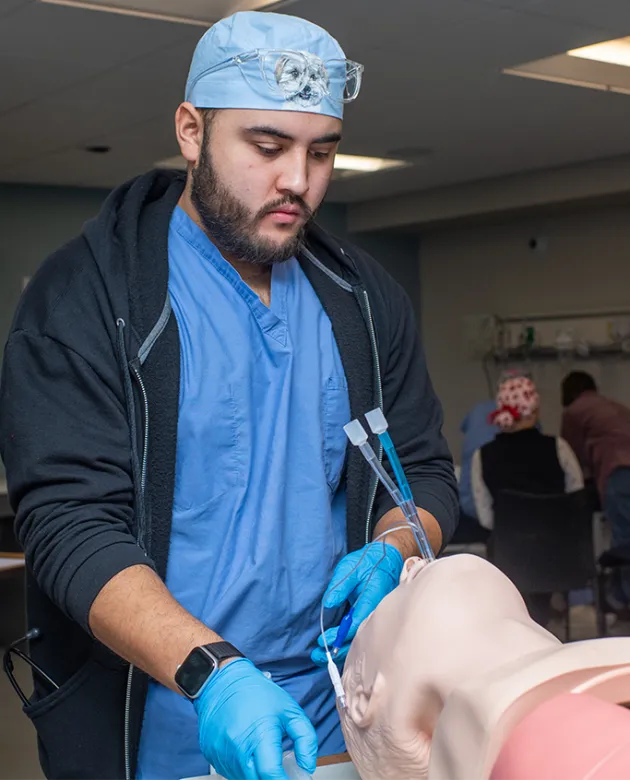
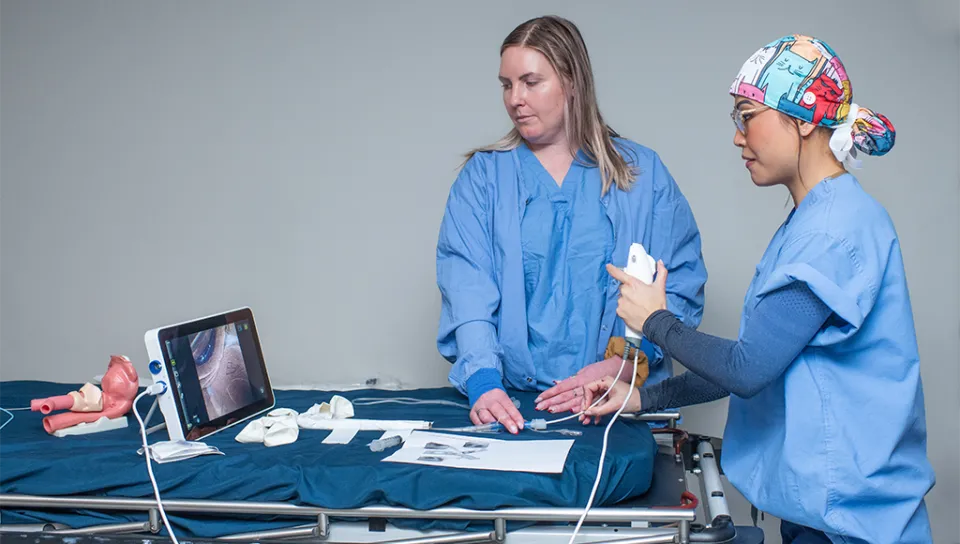
Career Path for Nurse Anesthesia Grads
Certified Registered Nurse Anesthetists (CRNAs) are legally licensed as registered nurses in all 50 states and certified nationally in the specialty of anesthesia. In addition to being the primary providers of anesthesia services in rural America, CRNAs constitute approximately half of the professionals qualified to administer anesthesia in urban areas.
As a CRNA, you will provide anesthesia in the operating room and many other departments in the hospital such as the emergency room, the ICU, outpatient facilities, radiology, and interventional procedural departments. You might work for dentists, dental specialists, podiatrists, plastic surgeons, or the increasingly common ambulatory surgical centers, health maintenance organizations (HMOs), preferred provider organizations (PPOs), and other alternative care facilities.
Currently, 47 percent of all CRNAs are employed by hospitals, 38 percent by physicians, and 12 percent contract their services independently. Others serve in the U.S. Military and Veterans Administration system.
The rewards of being a nurse anesthetist are many. You enjoy the opportunity to get involved in research that advances the science of anesthesia, enjoy the chance to broaden your clinical knowledge and enjoy the potential to teach others about anesthesia. You also receive a great deal of satisfaction from knowing you are making a direct contribution to your patients' well-being. Finally, you practice in one of the highest-paying nursing specialties.
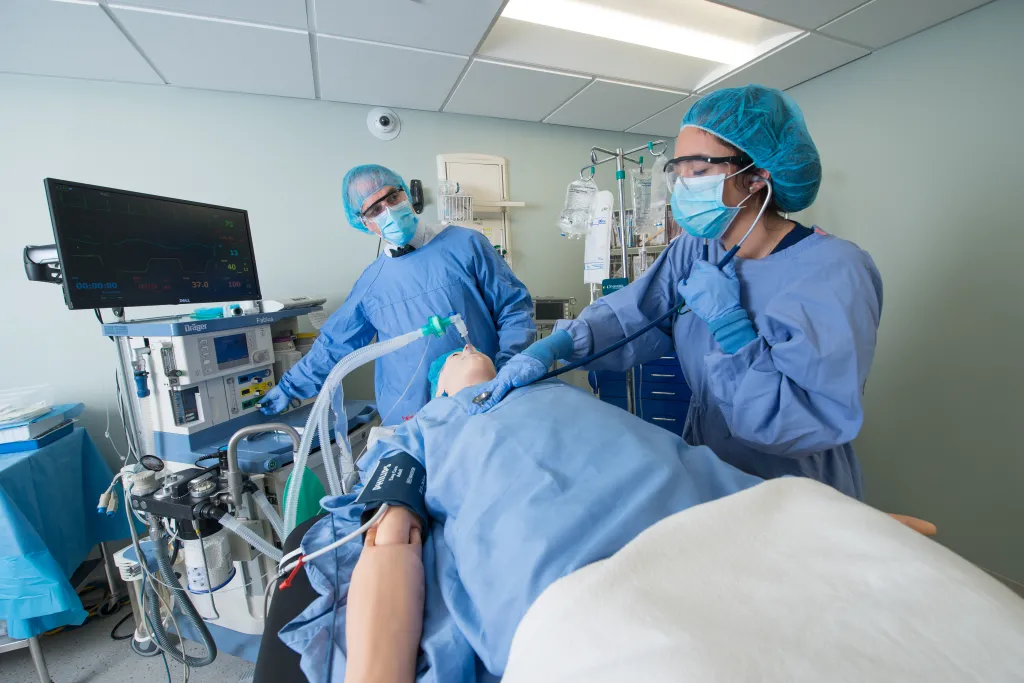
Nurse Anesthesia Degree Program facilities
As a student in our Nurse Anesthesia program, you benefit from the state-of-the-art educational resources on our Portland Campus for the Health Sciences, which include interactive classrooms equipped with the latest media and computer technology, electronic journals and books, and a clinical simulation program that features several high-tech patient simulators.
Beginning in your first semester, you participate in simulation exercises that provide a realistic facsimile of the work you’ll perform in the clinical environment. You translate theoretical knowledge into practice through a variety of simulated scenarios. Learn more about our Interprofessional Simulation and Innovation Center (ISIC).
Take a Virtual Tour of the ISIC
Nurse Anesthesia: Team-Based Learning
When students from different health professions disciplines learn with, from, and about each other to better understand different professional roles and expertise, great things can happen. In UNE’s D.N.P. program, you will be studying alongside students from other programs, including the Doctor of Osteopathic Medicine and Doctor of Dental Medicine program, gaining the skills to collaborate and lead in today’s team-based care. UNE is proud to be the only institution in New England that is part of the National Center for Interprofessional Education and Practice’s prestigious Innovation Network.
You also have the opportunity to apply this collaborative participation toward your Interprofessional Honors Distinction.
Hear what our alumni have to say about Interprofessional Education at UNE
Meet UNE D.N.P. Students
A Health Care Education Campus in Portland, Maine
UNE D.N.P. students study on the Portland Campus for the Health Sciences, a quintessential New England quad that has been welcoming students for more than a century. Lined with lush trees and brick buildings, the campus sits in a quiet neighborhood just a short drive from the downtown waterfront. Portland, named “America’s Most Livable City” by Forbes and “Foodiest Small Town in America” by Bon Appetit, is about 100 miles from downtown Boston. Take a Virtual Tour of our Portland Campus
Who can apply to the D.N.P. in Nurse Anesthesia program?
To apply to our D.N.P. in Nurse Anesthesia program, you must hold a Bachelor’s Degree (or higher) in Nursing or completion of an Associate’s Degree in Nursing and a Bachelor of Science degree in a science-related field of study.
All applicants should apply through Nursing Centralized Application Service (NursingCAS).
Financial Aid at UNE
Finance your education through loans, grants, and scholarships. We are committed to making our nurse anesthesia degree program as affordable as possible.
Accreditation
The School of Nurse Anesthesia is accredited by the Council on Accreditation (COA) of Nurse Anesthesia Educational Programs, a specialized accrediting body recognized by the Council for Higher Education Accreditation and the U.S. Department of Education.
The School of Nurse Anesthesia is accredited by the Council on Accreditation of Nurse Anesthesia Educational Programs through the fall of 2031. The program received the maximum 10-year accreditation length in the fall of 2021.
The Council on Accreditation (COA) of Nurse Anesthesia Educational Programs recognizes the program for providing a graduate-level curriculum leading to the award of a Doctor of Nursing Practice (D.N.P.) degree.
COA Contact
Council on Accreditation of Nurse Anesthesia Educational Programs (COA)
10275 W. Higgins, Suite 906, Rosemont, IL 60018, 1 (224)-275-9130; http://coacrna.org
Apply Today
Ready to begin your future in UNE’s accredited D.N.P. in Nurse Anesthesia program?
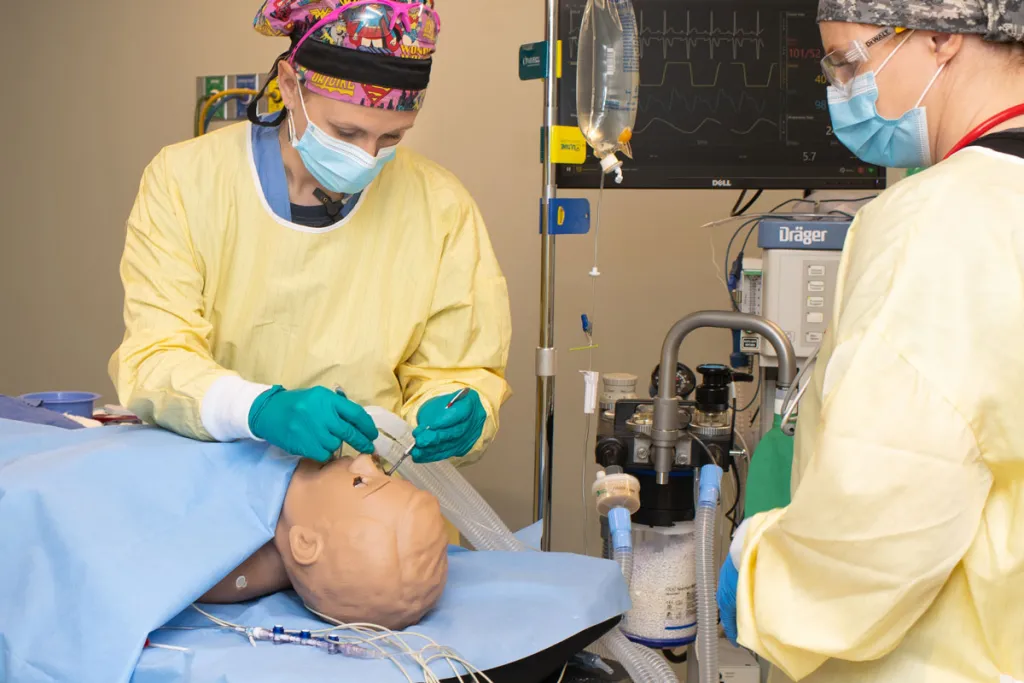
D.N.P. Frequently Asked Questions
What is a Doctor of Nursing Practice in Nurse Anesthesia? (D.N.P.-N.A.)
A Doctor of Nursing Practice (D.N.P.) is the highest level of nursing practice degrees, preparing nurse leaders to improve patient outcomes. A Doctor of Nursing Practice in Nurse Anesthesia, or D.N.P.-N.A. is the highest practice degree for certified registered nurse anesthetists (CRNA). As a CRNA with your D.N.P.-N.A. degree, you are able to work in a variety of settings that benefit from your level of expertise and skill in anesthesia.
Nurse anesthetists work with a surgical team composed of surgeons, nurses, and other physicians including anesthesiologists to provide anesthetics to patients of all ages. A CRNA provides anesthesia in the operating room and many other departments in the hospital such as the emergency room, the ICU, outpatient facilities, radiology, and interventional procedural departments.
At UNE, you will obtain your CRNA education through our nurse anesthesia degree program in Portland, Maine, where you will have access to state-of-the-art facilities and resources. Upon graduation, you will be eligible to sit for the National Certifying Exam (NCE) to obtain your certification. Students from UNE’s Nurse Anesthesia program are well positioned for success on the NCE. First-time exam candidates from our D.N.P. degree program consistently outperform the national average pass rate, with 95% of our graduates typically passing the NCE on their first try (PDF).
What is the difference between a D.N.P.-N.A. and a CRNA?
A D.N.P.-N.A. (Doctor of Nursing practice in Nurse Anesthesia) is a doctorate degree you earn after completing a D.N.P. degree program. A CRNA (certified registered nurse anesthetist) is a credential you get after passing a national certification exam through the National Board of Certification for Nurse Anesthetists (NBCRNA). Since 2022, the minimum degree requirement for becoming a CRNA is a D.N.P.-N.A., or a D.N.P.
UNE’s nurse anesthesia programs are proven to prepare students for the board exams. At 94% and 95% respectively, our students’ first-time NCE pass rates in 2019 and 2020 were 10 percentage points above the national average. Learn more about the exam and UNE pass rates.
Do I need an M.S.N.A. before entering a D.N.P.-N.A. program?
At UNE, you do not need an M.S.N.A. or M.S.N. to enter our D.N.P.-N.A. program. Generally, there’s a list of degree, licensure, and experience requirements that you need to have before entering a D.N.P.-N.A. program. Some schools may require an advanced nursing degree.
UNE provides a select group of experienced, graduate-level nurses with the highest level of didactic, simulation lab, and clinical site experiences through our nurse anesthesia degree program.
What are the requirements for D.N.P.-N.A. school?
Every D.N.P. degree program has slightly different requirements. It’s a good idea to review the nurse anesthesia program admissions requirements of the specific D.N.P.-N.A. programs that interest you.
At UNE, the completion of a bachelor’s degree (or higher) in Nursing or completion of an associate degree in Nursing and a Bachelor of Science degree in a science-related field of study is required. UNE also requires current unencumbered RN licensure in your home state at the time of application. Various clinical experiences along with a minimum cumulative GPA of 3.0 are some of the other requirements for admission to UNE’s D.N.P.-N.A. program.
UNE’s Doctor of Nursing Practice degree program has the mission to provide an academic environment that allows students to master the intellectual and technical skills necessary to become competent in the safe conduct of anesthesia. We strive to admit a select group of exceptional, graduate-level nurses who will learn at the highest level of didactic, simulation lab, and clinical site experiences.
What is the best D.N.P.-N.A. program for me?
When choosing a D.N.P.-N.A. program, you must consider where you will be provided with the best support. UNE’s 36-month Doctor of Nursing Practice in Nurse Anesthesia program checks that box. At UNE, we provide you with the intellectual and technical skills necessary to become a CRNA who is highly skilled in the safe administration of anesthesia. Our supportive faculty understands that when you succeed, the program succeeds. Supporting you in your studies is priority number one.
While on campus, you will have the opportunity to participate in experiential learning through our state-of-the-art simulation center. After completing the on-campus portion of our D.N.P. program, you will participate in hundreds of anesthesia cases at our clinical sites throughout New England, including rural sites and CRNA-only sites.
UNE is also one of a handful of private universities with a comprehensive health education mission that includes medicine, pharmacy, dental medicine, nursing, and an array of allied health professions.
How much do D.N.P.-N.A.s make?
Although it is ever changing, the median annual Doctor of Nursing practice in Nurse Anesthesia salary was $214,200 in May 2023 according to the Bureau of Labor Statistics. D.N.P.-N.A.s are generally one of the highest paid healthcare professionals. This high pay is directly related to the amount of responsibility you have as a nurse anesthetist.
Providers who seek to obtain a D.N.P. degree don’t just do it for the money. As a D.N.P.-N.A., you have the opportunity to take care of patients at their most vulnerable moments, and expand your practice in education, administration, and research that advances the science of anesthesia and further your ability to help others.
